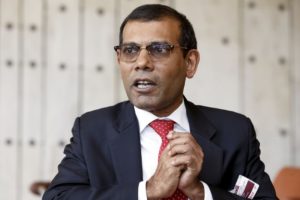MALÉ, Maldives — Political opponents of the Maldives government clashed with the police on the streets of the capital early Friday after the Supreme Court overturned the conviction of a former president living in exile in Britain and ordered the release of several other imprisoned politicians.
Hundreds of people celebrated in Malé, the capital, by waving the country’s flag after the court overturned verdicts against former President Mohamed Nasheed and a former vice president that were the result of trials that were internationally condemned. The court said in its ruling late Thursday that the guilty verdicts had been influenced by the government.
The police dispersed the crowds from the streets using pepper spray and batons. Rocks were thrown at police officers, and at least one injured officer was seen being carried to a hospital.
The ruling could allow Mr. Nasheed, the country’s first democratically elected president, to challenge President Abdulla Yameen when he seeks re-election later this year. Mr. Yameen, also known as Yameen Abdul Gayoom, is the half brother of former President Maumoon Abdul Gayoom.
An Indian Ocean nation known for its luxury tourist resorts, Maldives became a multiparty democracy 10 years ago after decades of autocratic rule. But it lost much of its democratic gains after Mr. Yameen was elected in 2013. He has maintained a tight grip on power, controlling institutions like the judiciary, the police and the bureaucracy.
The court ruling also reinstated 12 lawmakers who had lost their positions for switching allegiance to the opposition. Mr. Yameen’s Progressive Party of the Maldives will lose a majority in the 85-member Parliament when the ousted lawmakers return.
The government said in a statement that it was trying to “vet and clarify” the court’s ruling and “will work to engage, and consult with, the Supreme Court in order to comply with the ruling in line with proper procedure and the rule of law.”
The opposition alliance in a statement welcomed the ruling and called for Mr. Yameen’s resignation — saying the court’s decision “effectively ends President Yameen’s authoritarian rule.”
Mr. Nasheed had been sentenced to 13 years in prison on terrorism charges but was allowed to get medical treatment in Britain, where he received asylum.
The ruling could allow him to become eligible to run in the presidential election expected to take place between August and November.
Mr. Yameen had been set to run for re-election virtually unopposed, with all of his opponents either jailed or exiled.
The prison sentence currently disqualifies Mr. Nasheed as a candidate. In a statement last month while in neighboring Sri Lanka, Mr. Nasheed said the opposition parties were in talks to field a common candidate if he was unable to run. “President Yameen wants a coronation, not an election,” he said. “We won’t let that happen.”
Also named for release was Mr. Yameen’s former deputy, Ahmed Adeeb, who had been jailed on accusations of plotting to kill Mr. Yameen.
Th earticle appeared in the NY Times on 1/2/2018

